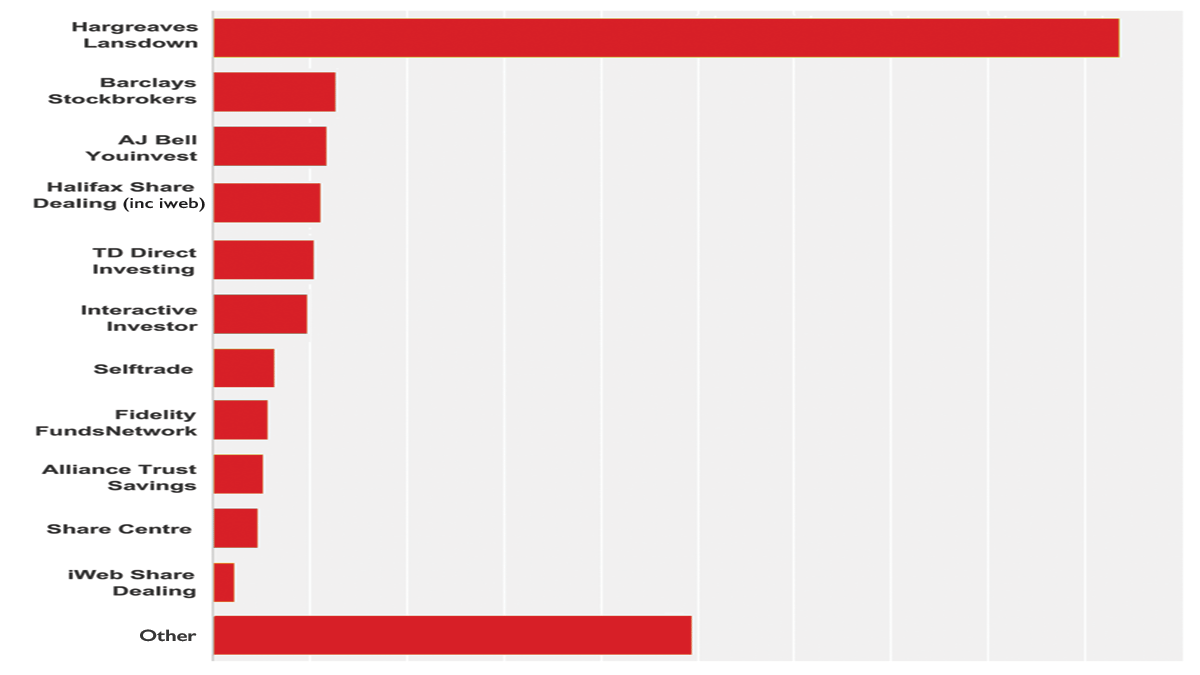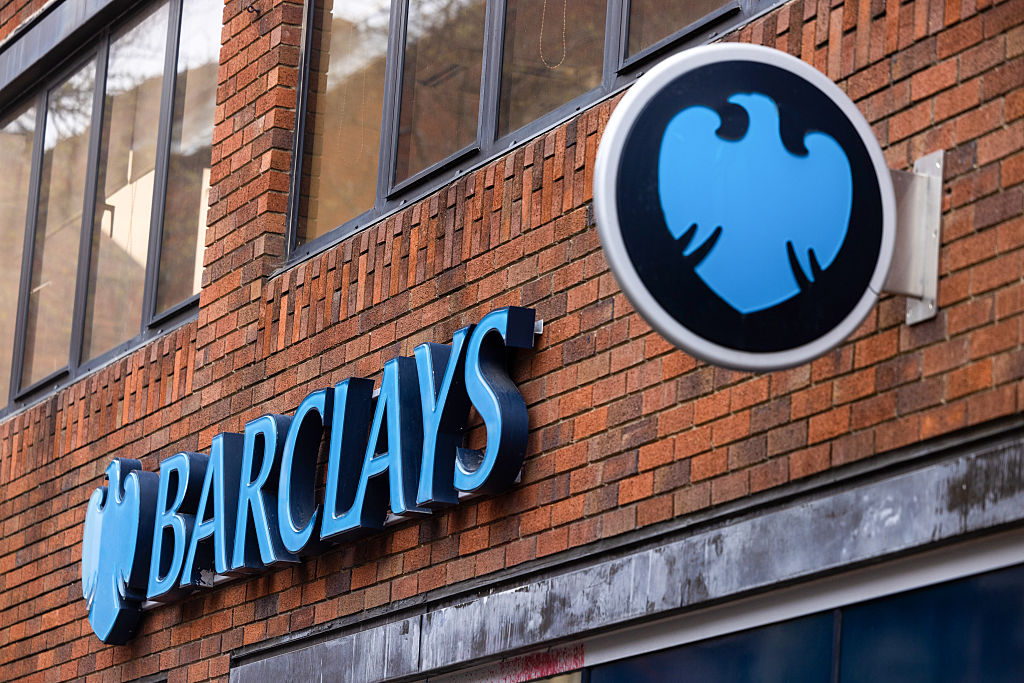The best brokers for your Isa
We asked MoneyWeek readers for their views on the top stockbrokers. Here are the results of our survey.
Get the latest financial news, insights and expert analysis from our award-winning MoneyWeek team, to help you understand what really matters when it comes to your finances.
You are now subscribed
Your newsletter sign-up was successful
Want to add more newsletters?

Twice daily
MoneyWeek
Get the latest financial news, insights and expert analysis from our award-winning MoneyWeek team, to help you understand what really matters when it comes to your finances.

Four times a week
Look After My Bills
Sign up to our free money-saving newsletter, filled with the latest news and expert advice to help you find the best tips and deals for managing your bills. Start saving today!

Which stockbroker or fund supermarket do you use the most?
Hargreaves Lansdown is by far the most popular online broker in the UK. More than 40% of MoneyWeek readers say that it's the provider they use most often. Barclays Stockbrokers, the second-biggest provider, lags a long way behind and will shortly fall to third when Interactive Investor and TD Direct Investing merge. AJ Bell Youinvest has been growing quickly.
Articles about picking online stockbrokers or fund platforms tend to focus on comparing fees, but feedback from our readers suggests that costs are not the biggest priority for many of you. As evidence of this, consider your feedback on Hargreaves Lansdown, the biggest UK broker, in our reader survey. It scores well on all the criteria we use for rating brokers, except for costs. Readers consistently say that the firm is expensive. And it is compared to many of its peers but it offers a high-quality service, which is presumably why customers are prepared to stay with it.
MoneyWeek
Subscribe to MoneyWeek today and get your first six magazine issues absolutely FREE

Sign up to Money Morning
Don't miss the latest investment and personal finances news, market analysis, plus money-saving tips with our free twice-daily newsletter
Don't miss the latest investment and personal finances news, market analysis, plus money-saving tips with our free twice-daily newsletter
For the most part, we agree with your conclusions. Fees are just one part of the equation. Other factors such as quality of customer service, range of investments available and the stability of the firm are also important. The complication when picking a broker is that there isn't a strong relationship between how much you pay and what you get. Hargreaves Lansdown mostly does a good job, but so do many cheaper firms. Conversely some pricey ones are much worse. To make matters worse, the way fees are charged varies greatly between brokers, which can make it difficult to see if you're getting a good deal.
How much will your Isa cost you?
Traditionally, brokers aimed to make money from dealing commission on shares, from ongoing commission paid to them by fund firms ("trail commission") on funds and from other sources such as the interest they earned by parking clients' cash balances in the bank. Explicit administration charges or custody charges for holding shares were not common for Isas.
That's now changing, for a number of reasons: costs have risen, trading volumes are weak, trail commission was banned in 2014 and interest rates are extremely low. So most providers have now introduced some kind of admin fee or custody fee. Such fees are usually either levied as a percentage of the value of the assets you hold with them or as a flat fee. As a general rule, percentage-based fees are better for small accounts, while flat fees are more cost-effective for larger accounts (although many brokers cap their percentage fees once it reaches a certain level).
Dealing charges may vary depending on what kind of investment you buy. Some providers do not charge for dealing in open-end funds (unit trusts and open-ended investment companies or Oeics). These providers will then typically charge a percentage-based custody fee for these funds. The vast majority of providers will charge you a dealing fee to buy and sell shares, investment trusts and other products that are not open-end funds, but will either charge no custody, a capped custody fee or a fixed admininstration fee (which may be waived if you trade a certain amount).
The dealing fees for securities priced in sterling typically vary from as little as £5 to as much as £15 per trade. Some providers offer lower trading charges for frequent traders, but keep in mind that trading so often generally has a negative effect on your long-term returns. For international stocks and even often for UK-listed securities priced in currencies other than sterling most brokers will levy a foreign currency conversion charge which may be 1% or more of the value of the trade.
You'll also want to take into account other factors, such as how well the broker's platform works and how good the firm's customer service is. Your priorities here are likely to depend on how you like to trade. If you prefer to trade over the phone, you will want a broker that has a good telephone broking team with decent opening hours. You'll also want to pay attention to the cost of telephone dealing, as this is often more expensive than online dealing. If you prefer to trade online, you are likely to want a provider whose website is easy to use.
The financial stability of your broker is also important. The Financial Services Compensation Scheme for investments will pay up to £50,000 in compensation (per customer per firm) if your broker goes bust and is unable to hand over money or investments kept with them. In almost all circumstances, your broker should be keeping its clients' cash and investments separate from the firm's assets, which means that they should not be available to creditors in the event of financial collapse and will eventually be returned to you.
However, sometimes when a broker fails, there are problems with this "ring fencing" or "segregation of assets" and it turns out that client assets particularly cash are missing due to negligence or fraud. So the FSCS is an important safety net. If your account is large and the £50,000 FSCS cover doesn't seem that much, you will want to look into the financial strength of your broker carefully and perhaps split your savings between more than one firm.
Popular brokers and their costs
So with all that in mind, let's catch up on who topped our reader poll. Hargreaves Lansdown came first last year and does so again this year. High scores for service are let down only by the worst ranking for costs among the major brokers. The Share Centre came second, up one place from last year. Its main negative points were a smaller (though still reasonable) range of investments and a lower ranking on financial strength (the latter essentially reflects our readers' subjective perception of how big, stable and established a company is in this case, The Share Centre is a far smaller firm than Hargreaves Lansdown, although it has been in business for more than 25 years and is listed, so investors can easily monitor its financials).
AJ Bell Youinvest slipped one place from second to third, which may have something to do with recent fee changes (it introduced a custody fee for shares in its dealing account and Isa for the first time). Like Share Centre, Youinvest ranked lower than Hargreaves Lansdown on perceived financial strength, reflecting its lower profile (the company is privately held, with investors including Neil Woodford, but publishes detailed financial reports).
Interactive Investor and TD Direct Investing, which have announced they will be merging in the near future, followed close behind. Interactive Investor's worst scores were for customer service and administrative efficiency; it also scored lower on perceived financial stability, reflecting the fact that it's owned by a private-equity fund rather than a high-profile company. TD Direct Investing, which is currently owned by Canada's Toronto Dominion Bank, scored acceptably on most categories, but ranked lower on fees.
Lastly, we found a curious quirk in the results for Halifax and iWeb. These are the same service, with the same owner (Lloyds Bank), but different fees (iWeb is far cheaper). iWeb users gave the firm top scores on costs but they also gave it much higher scores than Halifax in most other categories. In short, customers who are getting a very cheap service seem happier with this broker but those who are paying more had some reservations about the quality of customer service and the range of investments. Taking iWeb's scores alone, it would have topped the poll but if we consider the Halifax and iWeb scores combined, it would have ranked in line with AJ Bell Youinvest, Interactive Investor and TD Direct Investing.
Get the latest financial news, insights and expert analysis from our award-winning MoneyWeek team, to help you understand what really matters when it comes to your finances.
Sarah was MoneyWeek's investment editor. She graduated from the University of Southampton with a BA in English and History, before going on to complete a graduate diploma in law at the College of Law in Guildford. She joined MoneyWeek in 2014 and writes on funds, personal finance, pensions and property.
-
 Average UK house price reaches £300,000 for first time, Halifax says
Average UK house price reaches £300,000 for first time, Halifax saysWhile the average house price has topped £300k, regional disparities still remain, Halifax finds.
-
 Barings Emerging Europe trust bounces back from Russia woes
Barings Emerging Europe trust bounces back from Russia woesBarings Emerging Europe trust has added the Middle East and Africa to its mandate, delivering a strong recovery, says Max King
-
 Nationwide promises to protect all its branches from closures until at least 2030
Nationwide promises to protect all its branches from closures until at least 2030The building society has extended its pledge to keep all high street Nationwide and Virgin Money branches open, now until at least 2030.
-
 Barclays bank switch: how to get £400 'free' cash by moving accounts
Barclays bank switch: how to get £400 'free' cash by moving accountsBarclays has unveiled a £400 current account switching offer, running alongside its £500 ISA transfer deal. Which accounts are on offer, and are you eligible?
-
 Green mortgages: how do they work and how much can you save?
Green mortgages: how do they work and how much can you save?Most high-street lenders now offer some kind of green mortgage deal. We look at who’s eligible, how to apply and the mortgage rates and cashback on offer
-
 Thousands of Brits switch to Nationwide, Monzo and NatWest – which banks are least popular?
Thousands of Brits switch to Nationwide, Monzo and NatWest – which banks are least popular?We look at the most and least popular banks and building societies as current account bank switches reach a record high. Is it worth moving your money?
-
 Barclays to pay millions in compensation after IT outage chaos
Barclays to pay millions in compensation after IT outage chaosBarclays intends to compensate customers after an IT outage caused payment problems for three days
-
 Barclays reports large spike in romance scams - here's how to avoid them
Barclays reports large spike in romance scams - here's how to avoid themThe UK bank found a 139% increase in the total value of romance scams
-
 Nationwide, HSBC, Barclays and Virgin Money customers hit by payment issues
Nationwide, HSBC, Barclays and Virgin Money customers hit by payment issuesThe problems have been compounded as Friday is the last day of the month when many people are paid by their employer
-
 Interactive investor launches managed ISA – is it any good?
Interactive investor launches managed ISA – is it any good?If you want to invest but don’t know where to start, a managed ISA could be a good solution. Here's a first look at interactive investor’s new product and how it compares to others in terms of fees, investment choice and service.